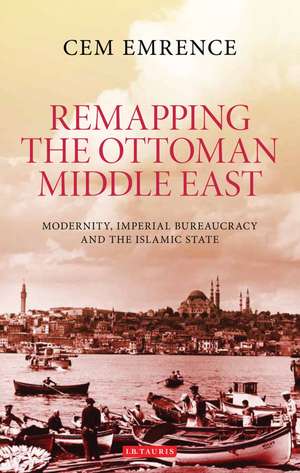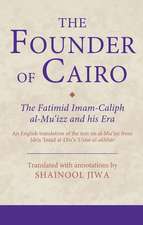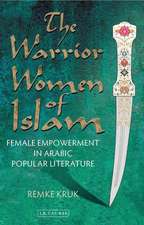Remapping the Ottoman Middle East: Modernity, Imperial Bureaucracy and Islam
Autor Cem Emrenceen Limba Engleză Paperback – 17 dec 2015
Preț: 163.71 lei
Preț vechi: 190.74 lei
-14% Nou
Puncte Express: 246
Preț estimativ în valută:
31.33€ • 33.50$ • 26.12£
31.33€ • 33.50$ • 26.12£
Carte disponibilă
Livrare economică 27 martie-10 aprilie
Preluare comenzi: 021 569.72.76
Specificații
ISBN-13: 9781784531614
ISBN-10: 1784531618
Pagini: 208
Ilustrații: 24 bw integrated
Dimensiuni: 138 x 216 x 25 mm
Greutate: 0.23 kg
Editura: Bloomsbury Publishing
Colecția I.B.Tauris
Locul publicării:London, United Kingdom
ISBN-10: 1784531618
Pagini: 208
Ilustrații: 24 bw integrated
Dimensiuni: 138 x 216 x 25 mm
Greutate: 0.23 kg
Editura: Bloomsbury Publishing
Colecția I.B.Tauris
Locul publicării:London, United Kingdom
Notă biografică
Cem Emrence is a post-doctoral fellow of history at the University of Massachusetts-Amherst. His research focuses on the Ottoman Empire and modern Turkey. His work has appeared in many academic journals including the Journal of Global History, Middle East Studies Association Bulletin, Middle Eastern Studies, Turkish Studies and Comparative Sociology. He teaches courses on the Ottoman Empire, Comparative Empires and the Modern Middle East among others.
Cuprins
INTRODUCTIONMethodImperial PathTheoryBackground and Plan of the Book1. HISTORIOGRAPHYModernization Approaches Macro Models Bargaining Perspectives Conclusions 2. COASTThe Making of a Globally-Connected EconomyMiddle Class Hegemony Economic Contention Conclusions 3. INTERIOR An Urban Muslim Bloc Creating Regional Markets Patrimonial Tensions Conclusions 4. FRONTIER Politics of EmergencCollecting Protection Money Rebellious Repertoires Conclusions5. ROUTES OF TRANSFORMATION, 1908-1922 The New Imperial Class Nationalizing the CoastFailed Bargains in the Interior Making Frontiers IndependentConclusionsCONCLUSIONLate Ottoman TrajectoriesOttoman InsightsA New Research Agenda















